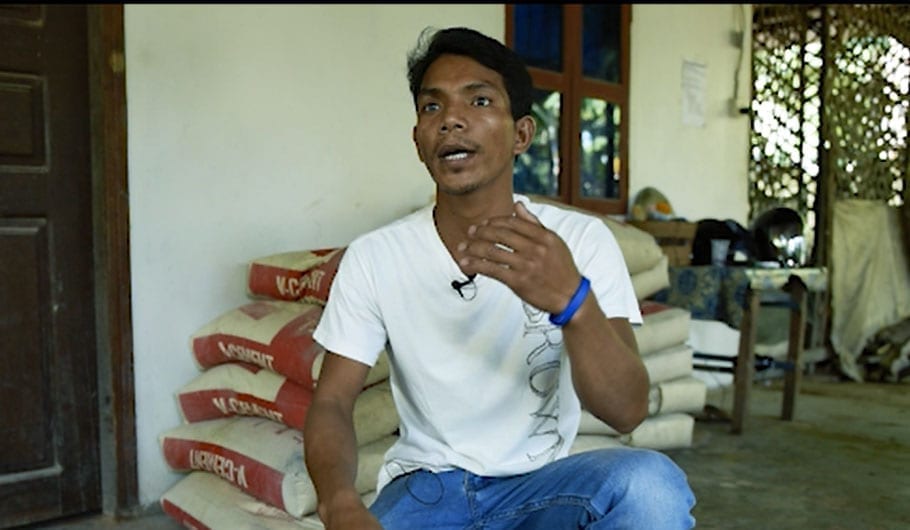
Aug 7, 2017
Cambodia’s Siem Reap temple complex draws millions of tourists each year. But what most tourists do not see are the restoration workers like Ong Kay, who are paid low wages and toil under the hot sun without safety clothing or equipment to protect against falling stones and other hazards.
Find out more.
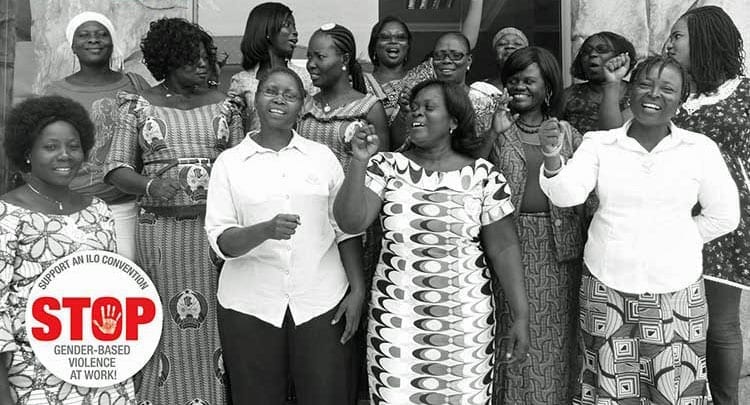
Aug 3, 2017
No global data document gender-based violence at work. But across the board, gender-based violence remains one of the most tolerated violations of workers’ human rights. Some 35 percent of women over age 15—818 million women globally—have experienced sexual or physical violence at home, in their communities or in the workplace.
The Solidarity Center and allies throughout the international labor, human and women’s rights communities are campaigning for an International Labor Organization (ILO) convention to stop violence and harassment at work. As part of the process, begun many months ago, the International Trade Union Confederation (ITUC) is now spearheading efforts to lobby governments and employer organizations around the world for their input and support. (The ITUC campaign toolkit includes talking points, resources and tips for lobbying your government.)
Allies are building awareness for passage of a convention and distributing an ILO questionnaire to their government representatives soliciting comments and support in advance of a September 22 deadline. When ILO member states ratify a convention, they commit to applying it in national law and practice, and complaints can be made against countries for violations. In June 2018, the ILO International Labor Conference (ILC) will take up the issue.
Gender-Based Violence: Worse Without Freedom to Form Unions
Domestic workers, whose isolation in employer homes makes them especially vulnerable to abuse, are strongly championing its passage. Building on the tactics of their successful global campaign for the 2011 ratification of ILO Convention 189 covering domestic workers—the last convention the ILO passed—they are reproducing those steps to ensure support for a convention to end gender-based violence at work, says Elizabeth Tang, general secretary of the International Domestic Workers Federation (IDWF).
“Gender-based violence is always worse when there is no freedom of association,” Solidarity Center Policy Director Molly McCoy said earlier this year. “When workers are not organized (in unions), they don’t have resources to tackle gender-based violence.” McCoy moderated a Solidarity Center panel in New York on gender-based violence at work in conjunction with the United Nations Commission on the Status of Women meetings.
Gender-Based Violence Includes Physical, Mental Abuse
In a detailed report issued in advance of the 2018 ILO conference, the ILO describes gender-based violence as affecting both women and men, but notes that unequal status and power relations in society and at work often result in women being far more exposed to violence and harassment, which can be physical, psychological and sexual.
In addition, the ILO uses the term “world of work” for a proposed convention, because gender-based violence occurs not only in the physical workplace, but during the work commute, at work-related social events, in public spaces—the primary venue for informal workers such as street vendors—and in the home, in particular for domestic workers and teleworkers.
Addressing violence and harassment through an international standard is key to the objectives of achieving decent work for all and addressing gender inequality in the UN’s 2030 Agenda for Sustainable Development (Goal 8 and Goal 5). A new standard would be preventative, by addressing negative societal and workplace cultures, and “should also be able to respond to the new challenges and risks which might lead to violence and harassment in the world of work, such as those arising from changing forms of work and technology,” according to an October 2016 report by the UN Meeting of Experts on Violence against Women and Men in the World of Work.
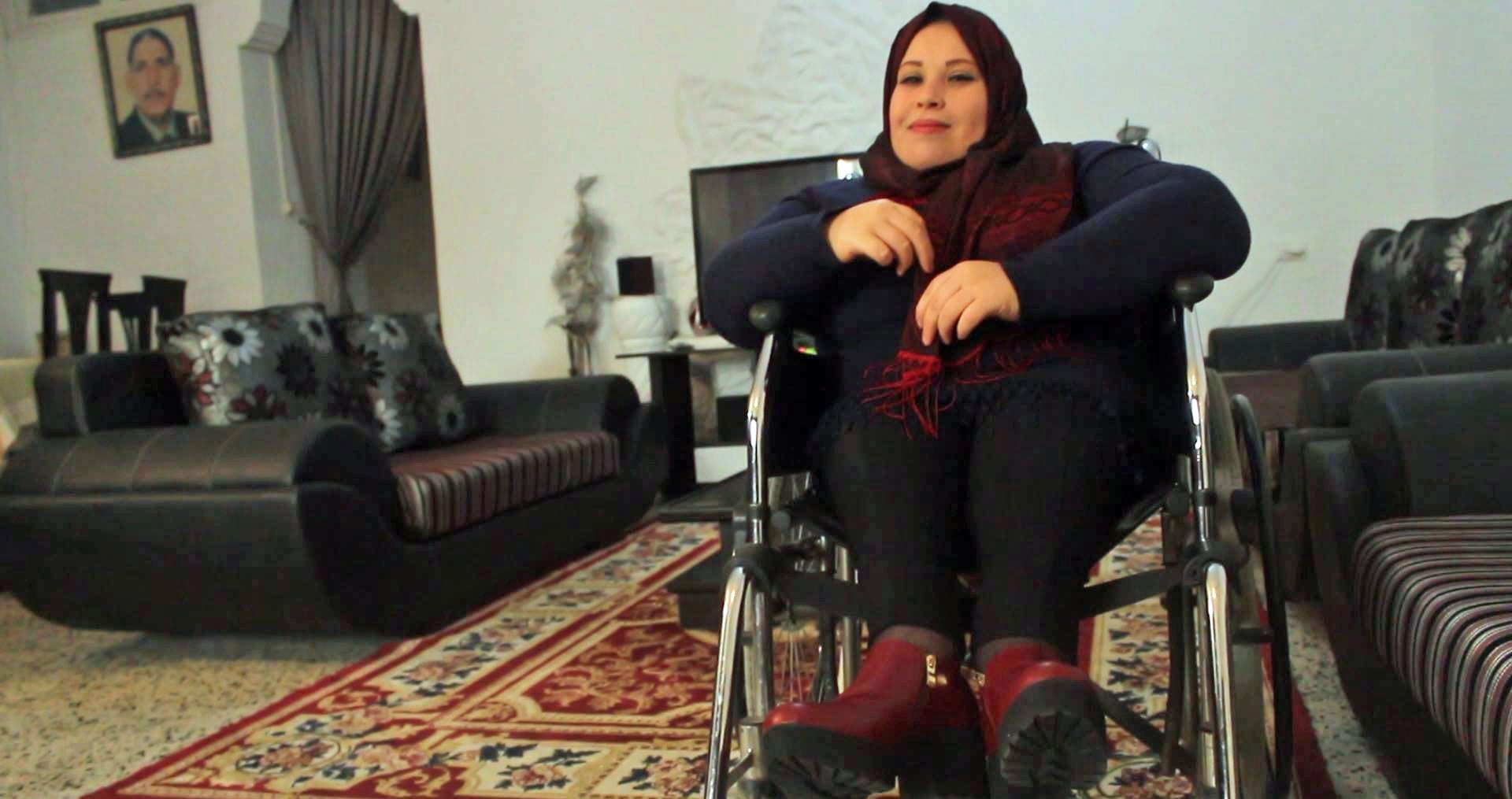
Jul 31, 2017
Sana Sabheni, 32, is confined to a wheelchair at her home in a four-story apartment complex in Tunisia. She does not leave her apartment for months at a time because her building does not have an elevator. Without resources to enable her mobility, Sabheni, who lives with her elderly mother, must crawl down two flights of stairs to reach street level. From there, she depends upon someone to carry her wheelchair down to her and push her through the streets. Lacking basic provisions for accessibility, she is unable to hold a good job or engage in everyday life.
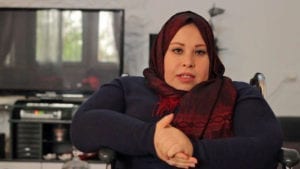
Through Solidarity Center assistance, Sabheni now has an electric wheelchair and the possibility of employment. Credit: Houcem Manai
Sabheni was among 1,601 participants in Solidarity Center surveys among workers with disabilities in Morocco and Tunisia. Conducted in partnership with Union Marocaine du Travail (UMT), Union Generales des Travailleurs Tunisiens (UGTT), and the Arab Forum for the Rights of Persons with Disabilities, the surveys are the first of their kind to examine how workers with disabilities and unions can address discrimination and lack of accessibility for workers in North Africa. The experiences of Sabheni and other workers with disabilities reveal how a powerful combination of discrimination, lack of appropriate accommodation and poor enforcement of existing laws deprives persons with disabilities of good jobs.
While the World Health Organization (WHO) reports that persons with disabilities account for 15 percent of the global population, in the Arab world unemployment rates for persons with disabilities can be as high as 90 percent. The Solidarity Center studies find that efforts to improve employment among persons with disabilities focus on “make-work” programs that rely on local charities rather than address accessibility. As a result, workers with disabilities often are marginalized into informal economy jobs with little access to workplace rights through unions.
Although legislation in both Morocco and Tunisia establishes hiring quotas for persons with disabilities, the surveys’ results suggest most private-sector employers pay little heed to this law and labor inspections have proven inadequate in forcing compliance.
Women with Disabilities also Challenged by Sexism
Sabheni now has an electric wheelchair and the promise of employment, the result of Solidarity Center partners’ support with support from Lilia Makhlouf from the Ministry of Employment and Vocational Training, and the generosity of a local businesswoman. Sabheni must still manage two flights of stairs on her own but once at the lower level of her building, she is able to access her new wheelchair and independent life outside her building.
Yet most persons with disabilities in North Africa will face immense obstacles to finding good jobs. In particular, women with disabilities are challenged by the double burden of sexism and ableism. For North African women, sexual harassment, violence, and other forms of abuse mean job opportunities can be both scarce and exploitative.
Reflecting on survey results, Nahla Sayadi, coordinator of the Women’s Committee in Monastir, Tunisia, and a member of the UGTT, summarized the dire conditions facing women with disabilities at work, in both Tunisia and Morocco.
“Even within the category of workers with disabilities, men have significantly better conditions than women,” she said “The rate of sexual harassment is shocking. Women with disabilities at work are subjected to exploitation—as workers, as disabled, and especially as women—three times as often.”
Unions the Strongest Voices for Rights of Workers with Disabilities
Sayadi touches on an important aspect of the struggle for disability rights at work. As an issue that is at once invisible and highly intersectional, disability rights can be a difficult subject around which to help workers form unions. Workers with disabilities may feel particularly beholden to their employers or otherwise fear reprisal, leaving them reluctant to speak out for their rights. By working alongside civil society groups, rights activists, and union leaders to complete these landmark studies, the Solidarity Center assembled a strong coalition committed to supporting workers with disabilities.
“[The study] has given me a lot of energy to continue my struggle as a trade unionist and activist,” Sayadi concluded.
The ILO reported in a recent review that labor unions are already the strongest voices advocating for the rights of persons with disabilities at work around the world. Public-sector unions, where survey data shows persons with disabilities experience higher levels of union representation and are natural organizers around rights issues because of their position at the nexus of governance and work. Armed with unprecedented data on the subject, union allies are now better prepared to fulfill this role across North Africa.
Following the studies, which were funded by the Ford Foundation, 13 workers with disabilities contacted the UMT in Morocco to learn more about the union and their rights as workers. In Tunisia, the study brought 82 workers with disabilities into the UGTT. Working with a regional labor movement committed to building inclusivity, the Solidarity Center is empowering persons with disabilities to exercise their rights as workers in a region where they face dynamic challenges to finding decent work.
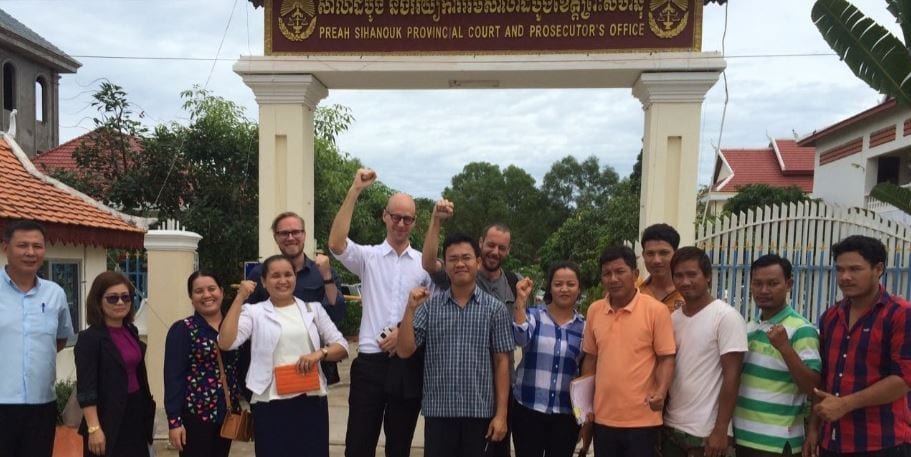
Jul 31, 2017
A $60,000 claim by Cambodia’s largest brewer against the Cambodian Food and Service Workers Federation (CFSWF) and its leader, Sar Mora, was dismissed this week by the Cambodian Provincial Court in Sihanoukville, putting an end to what the union alleges is the latest volley in the company’s years-long campaign to intimidate workers.
Cambrew, which is 50 percent owned by a Danish brewing conglomerate Carlsberg, had filed a civil case against the federation alleging damages for a spontaneous, five-day walkout by 100 workers in August last year.
CFSWF—co-represented by the Solidarity Center and Cambodian human rights and legal aid NGO Center for Alliance of Labor and Human Rights—welcomed the outcome of the legal case, but also said the suit and the court’s $3,000 fine against the leader of a second independent union, Democratic Workers Union, is further evidence a long-term campaign of intimidation by the company against workers.
Mora said the suit was an attack on workers’ right to fair representation and characterized the suit against himself and CFSWF as harassment—because he was personally named in the lawsuit and under Cambodian law could have been imprisoned if CFSWF failed to pay a fine imposed by the courts.
“I think the real cause [for the case] is that Cambrew doesn’t want our independent union in their company, and from time to time they make threats to our members, activists and union leaders,” he said.
CFSWF alleges that the legal attack represents a years-long pattern of hostile acts by the employer, including:
- Targeting CFSWF activists representing the interests of beer promoters, who are mostly young women working in bars and beer gardens to promote the employer’s brand. The company barred 11 union activists from returning to work in violation of an arbitration ruling allowing all the women to return, following a strike. CFSWF alleges employer retaliation against the women for opposing two measures imposed by the employer in early 2016, including the use of temporary contracts to deny permanent jobs with benefits such as paid maternity leave, as well as shifting the women’s hours to less desirable and potentially dangerous late-night hours, with no increase in pay.
- Excluding CFSWF from workplace consultation.
- Intimidating workers into not joining
- Offering some union members unspecified and secret compensation outside of negotiations with CFSWF, to avoid violating the labor law and having to pay severance.
- Targeting workers who belong to CFSWF for firing or layoffs, or subjecting them to last-minute shift schedule changes and less desirable positions inside the company.
- Targeting members of the independent union disproportionately in a round of layoffs last month that saw more than 200 workers lose their jobs.






